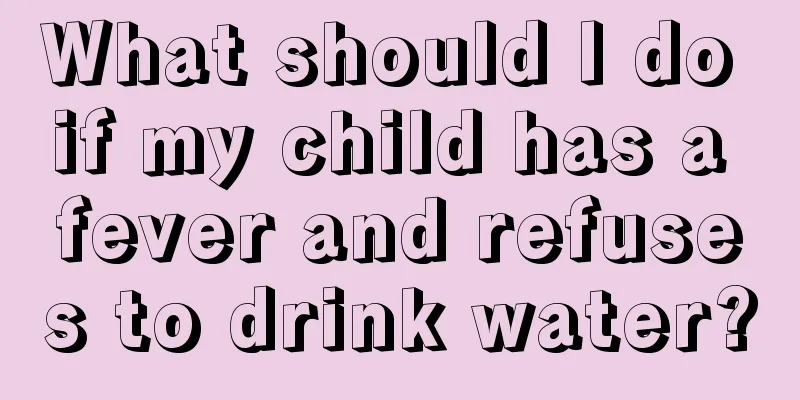What to do if your baby has diarrhea and watery stools

|
When many parents find that their baby has diarrhea, their first reaction is to give the child medicine. In fact, some babies' diarrhea is not a disease, but a normal physiological characteristic, such as hunger diarrhea or physiological diarrhea. These are relatively normal. If parents can give their children medicine, it will only hurt the baby's stomach and intestines. Whether the baby can take medicine for diarrhea depends on the results of the examination. 1. Physiological diarrhea - wait patiently for the baby to grow up Some babies start to have diarrhea shortly after they are born, with bowel movements ranging from three to four times a day to eight or nine times a day. Although the frequency of bowel movements is frequent, the appearance is relatively normal, being yellow or yellow-green in color without pus or blood. The condition can last for a long time, up to several months or even half a year. This physiological diarrhea is not pathological. The baby does not show any discomfort. Instead, he is fatter. His spirit and appetite are good. His growth and development are not affected at all and he looks very healthy. There is no cure for physiological diarrhea and it does not require any treatment. Once the baby is 6 months old and starts to add complementary foods, the diarrhea will gradually improve and disappear. Parents do not need to worry, just wait patiently. However, since babies have frequent bowel movements, they are prone to diaper rash, so you must take good care of your baby's butt, change diapers or diapers frequently, and use diaper cream to protect the skin when necessary. If diaper rash occurs, it is important to strengthen the protection of the local skin to prevent damage and infection. 2. Hunger diarrhea - not feeding the baby enough It is said that babies will have diarrhea if they eat too much. Does that mean they will also have diarrhea if they don’t eat enough? This is indeed the case. Some mothers are always worried that their babies will have difficulty digesting food if they eat too much, so they dare not let them breastfeed as much as they want. Because if they are not full, their intestinal peristalsis will speed up, causing the baby to defecate more frequently. Because the baby does not get enough milk, he gets hungry very quickly. He starts crying when it is not time to feed and his little mouth looks around for his mother's nipple. There is no other way to improve hunger diarrhea except to feed more, but you should pay attention to increasing the amount of milk gradually and not all at once, otherwise indigestion may really occur. You should increase the amount of milk every three or four days and observe the baby's condition. If the frequency of bowel movements does not increase, you can continue to increase the amount until the hunger diarrhea disappears. 3. Cold abdomen - not taking good care of the baby Babies are not very quiet when they sleep and often kick off the quilt. If the mother does not pay attention, the baby's belly may be exposed, which can easily cause the abdomen to catch a cold. Once the abdomen catches a cold, the intestinal smooth muscles will be stimulated, contraction will increase, intestinal peristalsis will be significantly accelerated, and the intestinal contents will be transported quickly, causing the stool to be watery and mixed with undigested food, and the frequency of bowel movements will also increase. What the mother needs to do is to protect the baby's belly as soon as possible and prevent it from catching cold again. Normally, do not dress your baby in belly-exposing clothes; cover the baby's stomach when sleeping. To prevent the baby from kicking off the quilt and catching a cold, you can use a sleeping bag instead; in the hot summer, the baby's limbs can be left uncovered, but the stomach must be covered. 4. If you don’t know the cause, see a doctor It is sometimes difficult to figure out what kind of diarrhea your baby has. It may be caused by a single reason, or it may be a combination of several reasons. When you can't make a clear judgment, seek medical attention in time. |
<<: 48 What to do if your child has stomach discomfort and vomits
>>: Baby has diarrhea after taking jaundice medicine
Recommend
What’s going on with the red blood streaks on my child’s face?
When there are many red blood streaks on the face...
Why is the baby gagging?
In life, many babies are prone to vomiting. In fa...
What to do if baby has red pimples on face
There are many reasons that can cause small red p...
What causes red eye bags in children?
When a person cries for a long time, his eyes wil...
Infant suction device plus nursing treatment
After catching a cold, many babies still have dif...
What should I do if my baby often loses his temper?
Children are the apple of their parents' eyes...
What causes stomach pain in children?
In our daily life, we often find children sufferi...
Symptoms of onychomycosis in children
If a child has onychomycosis, parents must take t...
My child's ears seem to be stuffy with water, what's going on?
If a child has symptoms of stuffy ears as if wate...
How to treat congenital amblyopia in children?
Amblyopia refers to the absence of obvious organi...
What should I do if my two-month-old baby refuses to eat at night?
Generally, babies will not like to breastfeed whe...
Baby can't sit steadily at six months old
The baby's motor development is very regular....
What to do if your toddler cries while sleeping at night
Some young children have trouble falling asleep a...
Can children with roseola be exposed to the wind?
Roseola infantum is most common in babies aged si...
Treatment for separation anxiety in young children
When children reach the age to go to kindergarten...









